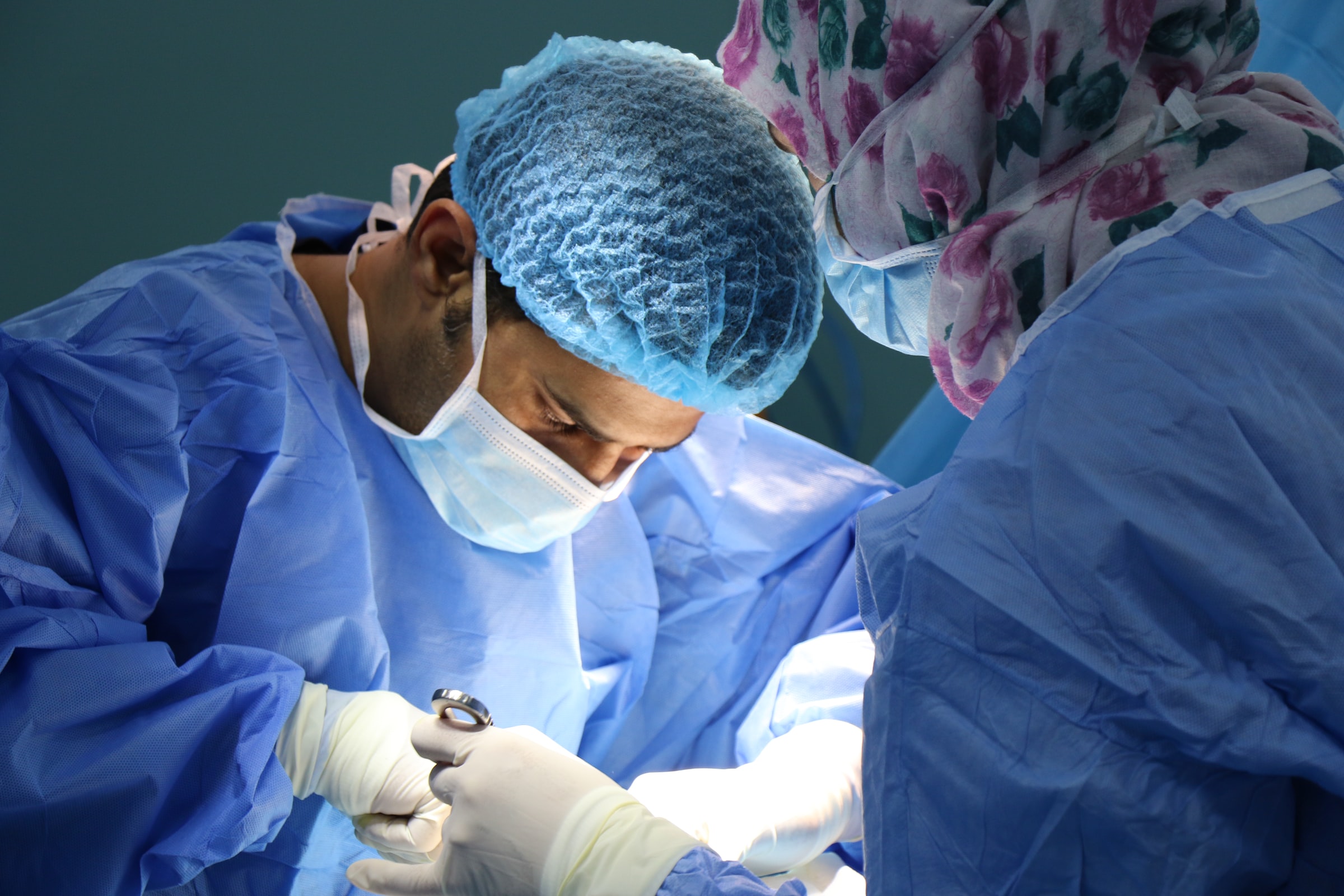
MRCS Part A Preparation
If you’re taking the MRCS Part A exam, this guide will provide information about the structure and syllabus, and advice on how to prepare, what to consider when choosing an MRCS Part A question bank and how to pass the exam.
For information on applying, preparing and undertaking the MRCS Part B, visit our complete guide.
You may have heard that Part A of the exam has a low pass rate. The most recent figures published for exams in September 2021 and May 2022 showed only 45.7% and 43.4% of candidates passed. However, if you prepare well, you can realistically expect to pass the first time! And given the expense of the exam and the time it takes to prepare, this will undoubtedly be the goal.
Structure of MRCS Part A
The MRCS Part A is a five-hour multiple-choice exam. It consists of the following two papers which must be completed on the same day:
| Paper 1 – applied basic sciences | Paper 2 – principles of surgery in general | |
|---|---|---|
| When | AM | PM |
| Duration | 3 hours
(Two 90-minute sections with a 10-minute comfort break in between) |
2 hours |
| Number of questions | 180 | 120 |
A single best answer (SBA) format is used for the questions. For every question, you’ll be given five possible answers and need to select the single best option.
How is the MRCS Part A syllabus broken down?
The MRCS Part A assesses your knowledge of applied basic science (paper 1) and principles of surgery in general (paper 2) to a level that would be expected of you, as a surgical trainee, two to three years after you’ve qualified.
The MRCS Part A syllabus is separated into the following ten modules:
- Basic science knowledge relevant to surgical practice
- Common surgical conditions
- Basic surgical skills
- The assessment and management of the surgical patient
- Perioperative care of the surgical patient
- Assessment and early treatment of the patient with trauma
- Surgical care of the paediatric patient
- Management of the dying patient
- Organ and tissue transplantation
- Professional behaviour and leadership skills
Each of the MRCS Part A papers are designed to assess across the syllabus but the following is a guide to the number of questions for each topic:
Paper 1 – Applied Basic Science
| Topic | Subtopic |
|---|---|
| Applied Surgical Anatomy (75 questions in total) |
Regional Anatomy 63 questions, including:
|
| Surgically related embryology and development 8 questions, including at least 1 of each of the following:
|
|
| Surface and imaging anatomy 4 questions, including at least 1 of head & neck. |
|
| Applied Surgical Physiology (45 questions in total) |
General physiological principles 15 questions |
| The physiology of specific organ systems relevant to surgical practice 30 questions, including:
|
|
| Applied Surgical Pathology (37 questions in total) |
General pathological principles 9 questions (from across the 7 subcategories) |
| Surgical immunology 2 questions |
|
| Surgical haematology 2 questions |
|
| Surgical clinical chemistry 2 questions |
|
| Principles of neoplasia & oncology 2 questions |
|
| The pathology of specific organ systems relevant to surgical care, including congenital anomalies 20 questions, including:
|
|
| Pharmacology as applied to surgical practice (8 questions in total) |
From any combination of subcategories as will produce 8 items |
| Microbiology as applied to surgical practice (7 questions in total) |
From across the subcategories |
| Imaging (5 questions in total) |
From across the subcategories |
| Data interpretation and audit (3 questions in total) |
From across the subcategories |
Paper 2 – Principles of Surgery in General
| Topic | Subtopic | Number of questions |
|---|---|---|
| Common congenital and acquired surgical conditions (45 questions in total) |
Gastrointestinal disease | 7 |
| Breast disease | 3 | |
| Vascular disease | 4 | |
| Cardiovascular & pulmonary disease | 4 | |
| Genitourinary disease | 4 | |
| Orthopaedic conditions | 7 | |
| Diseases of the skin, head & neck | 4 | |
| Neurology and neurosurgery | 2 | |
| Endocrine disease | 4 | |
| The lymphoreticular system | 2 | |
| Principles of cancer therapy and palliative care | 2 | |
| Acute emergencies | 2 | |
| Perioperative management (35 questions in total) |
Preoperative assessment & management | 7 |
| Intraoperative care | 5 | |
| Perioperative care | 2 | |
| Postoperative care | 8 | |
| Nutritional management | 2 | |
| Haemostasis & blood products | 3 | |
| Coagulation, deep vein thrombosis & embolism | 3 | |
| Metabolic & endocrine disorders | 5 | |
| Assessment and management of patients with trauma (including the multiple injured patient) (30 questions in total) |
General | 4 |
| Shock | 2 | |
| Wounds & soft tissue injuries | 4 | |
| Burns | 2 | |
| Fractures & dislocations | 8 | |
| Organ-specific trauma | 10 | |
| Surgical care of children | From across the subcategories | 7 |
| Medico-legal aspects of surgical practice | From across the subcategories | 3 |
How to prepare for MRCS Part A
As you’ll see from the syllabus breakdown above, an extensive list of topics is squeezed into the five-hour exam. To help you prepare for these, there are a range of resources that you can use, including:
- The MRCS syllabus
- Recommended textbooks
- Practice questions
- Mock exams
To prepare fully, it’s recommended that you incorporate all of these resources into your MRCS Part A preparation.
We’ll explore the use of MRCS question banks and practice questions in the following two sections, but you can find more information about how to prepare, including the recommended reading list, in our MRCS Part A Complete Guide.
MRCS question bank
An MRCS question bank will be one of the most valuable investments you can make for your exam preparation. A high quality question bank will give you access to well written practice questions, so you can become familiar with the types of questions you’ll be asked, practice applying your knowledge and receive feedback on your performance. It should also provide answer explanations that further your understanding of the topics so you can continue to learn and develop during your exam preparations. However, it can be difficult to know which question bank to choose. You may want to consider the following to help you find the best MRCS Part A question bank for you:
- The cost of the question bank and if it’s good value – i.e. how many questions are included and how long is the subscription. Access to a wider range of practice questions will give you more opportunities to expand your knowledge and prepare more thoroughly for the MRCS Part A. Our adaptive MRCS Part A question bank has the following subscription options:
- The quality of the resource – are the questions and explanations providing opportunities to further your learning? For each question in the Medibuddy MRCS Part A question bank, you’ll be given a detailed explanation to help you understand what the correct answer is and why, as well as suggested further reading to enhance your understanding of the topic.
- The ability to track your progress – is feedback provided on how you’re performing, is it easy to see where you’re making progress and to identify areas that you need to improve? Our dashboard provides a clear breakdown of how you’re performing in each topic of the exam, so you can see which areas you’ve “mastered” and which you need to dedicate more revision time to, based on how much you’ve shown the algorithm that you know.
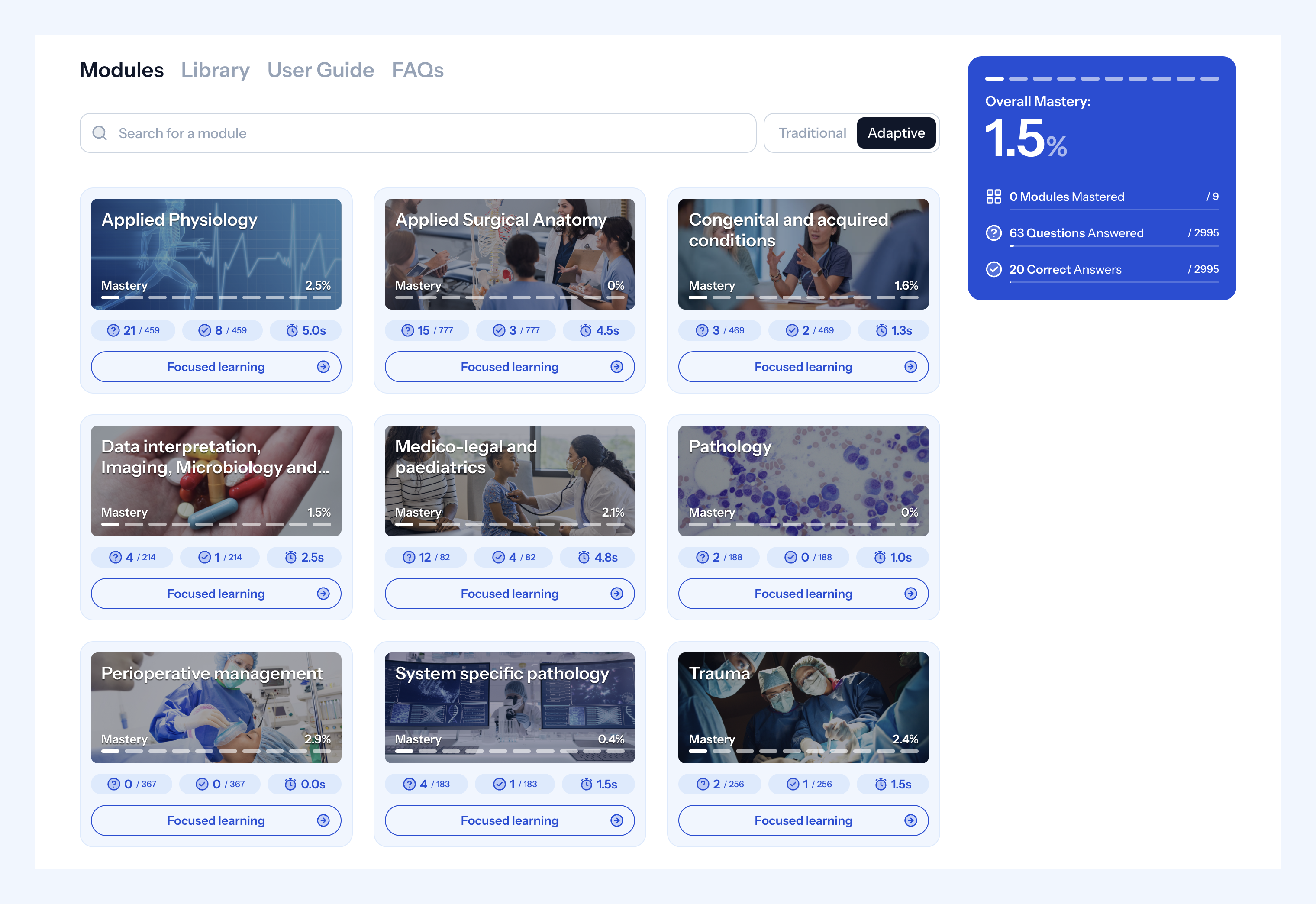
- Will the practice questions be personalised to your learning needs? Personalised learning is revolutionising medical education. Unlike traditional question banks, which treat everyone the same regardless of their abilities, a personalised question bank adapts to individual strengths and weaknesses. A question bank which includes this learning method will automatically identify the topics which you need to improve for the MRCS Part A and direct your learning to meet these needs, making your revision more purposeful and effective.
The following is a comparison table of different MRCS Part A resources so you can see how they compare:
 |
Passmedicine | Pastest | eMRCS | OnExamination | |
|---|---|---|---|---|---|
| Number of questions | 3,000 | 1,300 | 4,300+ | 2,000+ | 2,020+ |
| Price | £25+ | £15+ | £84+ | £35+ | £69.99+ |
| AI Personalised Learning |  |
 |
 |
 |
 |
| Mastery Level Calculated |  |
 |
 |
 |
 |
| Spaced Repetition |  |
 |
 |
 |
 |
Naturally, we’re big fans of our adaptive MRCS Part A question bank. With thousands of professionally written MRCS Part A practice questions and high quality explanations, you have the opportunity to practise answering questions, learn from your mistakes and develop your knowledge of the syllabus topics. But what we think really sets our MRCS Part A question bank apart is our sophisticated, state-of-the-art algorithms, which deliver all of the following:
- Continually calculates your mastery level so you can always clearly see how you’re performing in each area and how you’re progressing through the question bank.
- Monitors your progress and identifies your strengths and your areas for development.
- Automatically adapts to your individual learning needs and ensures that you focus on the MRCS Part A topics that will impact your exam score the most.
- Gives you the right questions at the right time (rather than the same questions for everyone!), so your revision is targeted, and your time is used effectively.
To find out more about personalised learning and how it can help your MRCS Part A preparation, check out our MRCS Part A question bank.
Practice questions
Practice questions will undoubtedly be essential to your MRCS Part A preparation. But how do you know you’re getting the most out of your practice questions? To make the most productive use of your revision time, you might find it helpful to incorporate the following when completing practice questions:
- Identify topics which you need to improve
- Complete background reading to develop your understanding of these topics
- Repeat questions that you’ve previously answered incorrectly and assess if you’ve now mastered these topics or if you still need to complete further reading
With most question banks, you should be able to view how many questions you have answered incorrectly, so you can use this to identify areas that you need to improve and begin working on these. With the Medibuddy MRCS Part A question bank, this will all happen automatically. You’ll be given questions on the topics you need to improve, provided with detailed explanations and further reading to develop your knowledge, and assessed to see if you’re now mastering these topics.
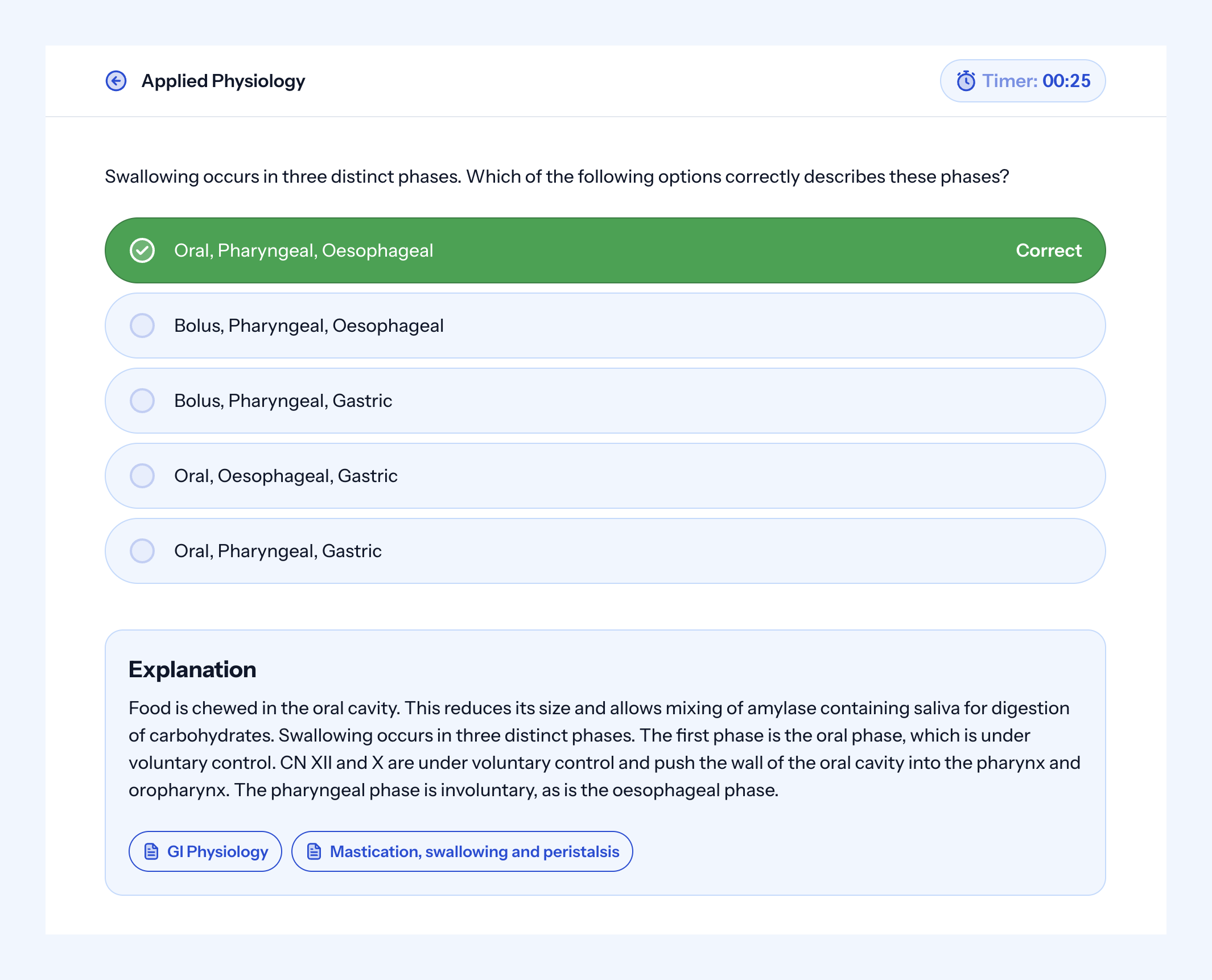
Question from the Medibuddy MRCS Part A question bank with answer explanation and further reading.
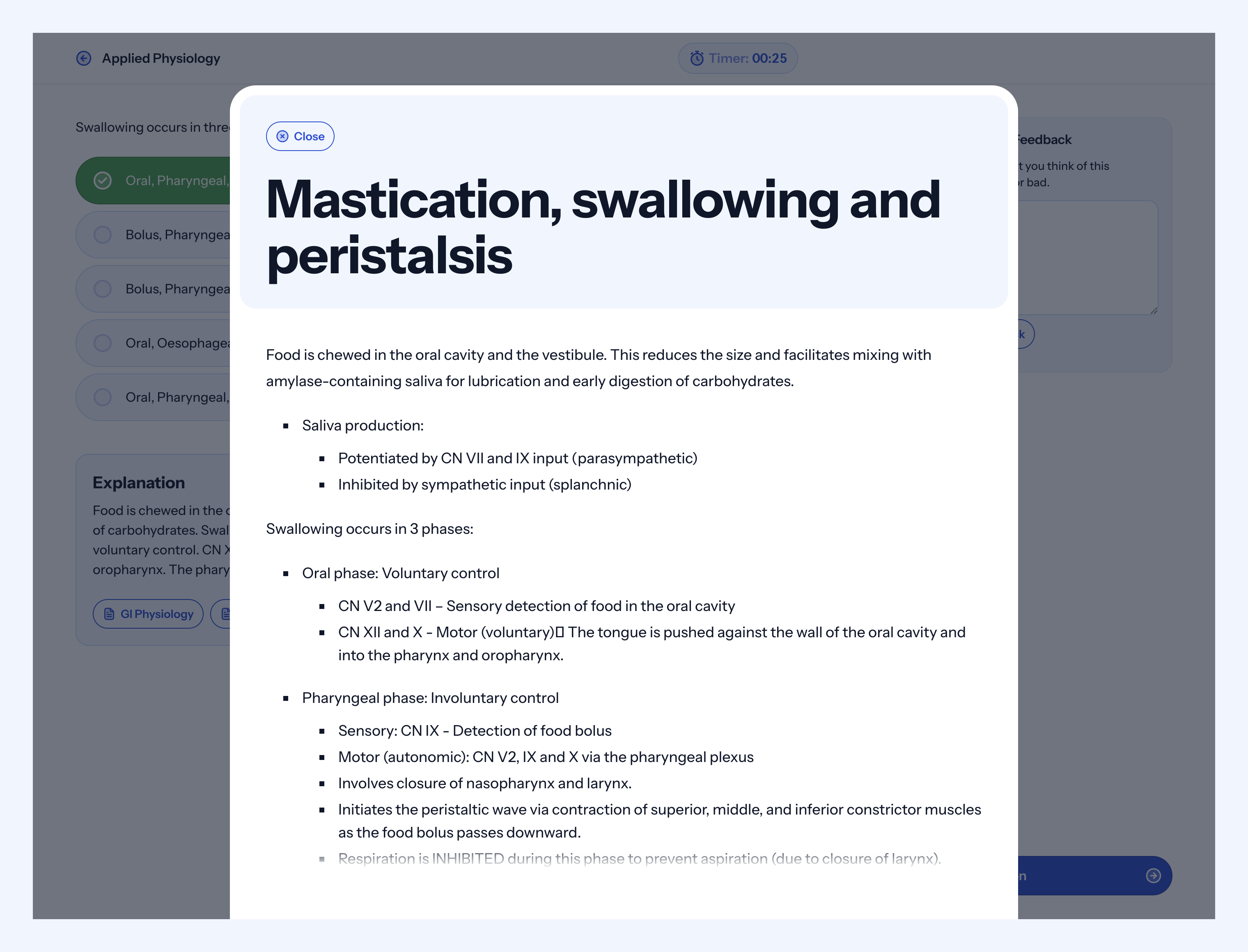
Example of further reading from the Medibuddy MRCS Part A question bank.
For questions you’ve answered incorrectly, you’ll automatically revisit them later to ensure that they’ve been mastered, meaning you don’t need to think about manually going back through and repeating them. The dashboard also means it’s easy for you to track your progress and identify areas which you need to dedicate more revision time to.

How to pass MRCS Part A
As mentioned previously, the MRCS Part A does have a low pass rate, which understandably concerns many candidates preparing for the exam. Focus your efforts on preparing well, using the MRCS syllabus, recommended reading list and high quality practice questions.
How many questions should I answer to prepare for the MRCS Part A?
Unfortunately, there’s no set number of questions that will ensure you pass the MRCS Part A. Your knowledge and experience will differ from other candidates taking the exam, so there really is no benefit in comparing how many questions you answer. Rather, you should focus on the quality of your MRCS Part A preparation. Aim to incorporate a wide range of questions, so you have experience of different questions and topics, and don’t skim over answer explanations and further reading, which can be valuable learning opportunities.
Factors such as when you take the exam will also play a key part in how well you perform in the MRCS Part A. For guidance on when is the best time to take the exam, and more tips to help you to revise effectively, visit our MRCS Part A Complete Guide. You’ll also find advice on how to avoid the most common mistakes made by MRCS candidates on our website, along with our adaptive MRCS Part A question bank to help you make the most of your preparation time.
Good luck with your exam!
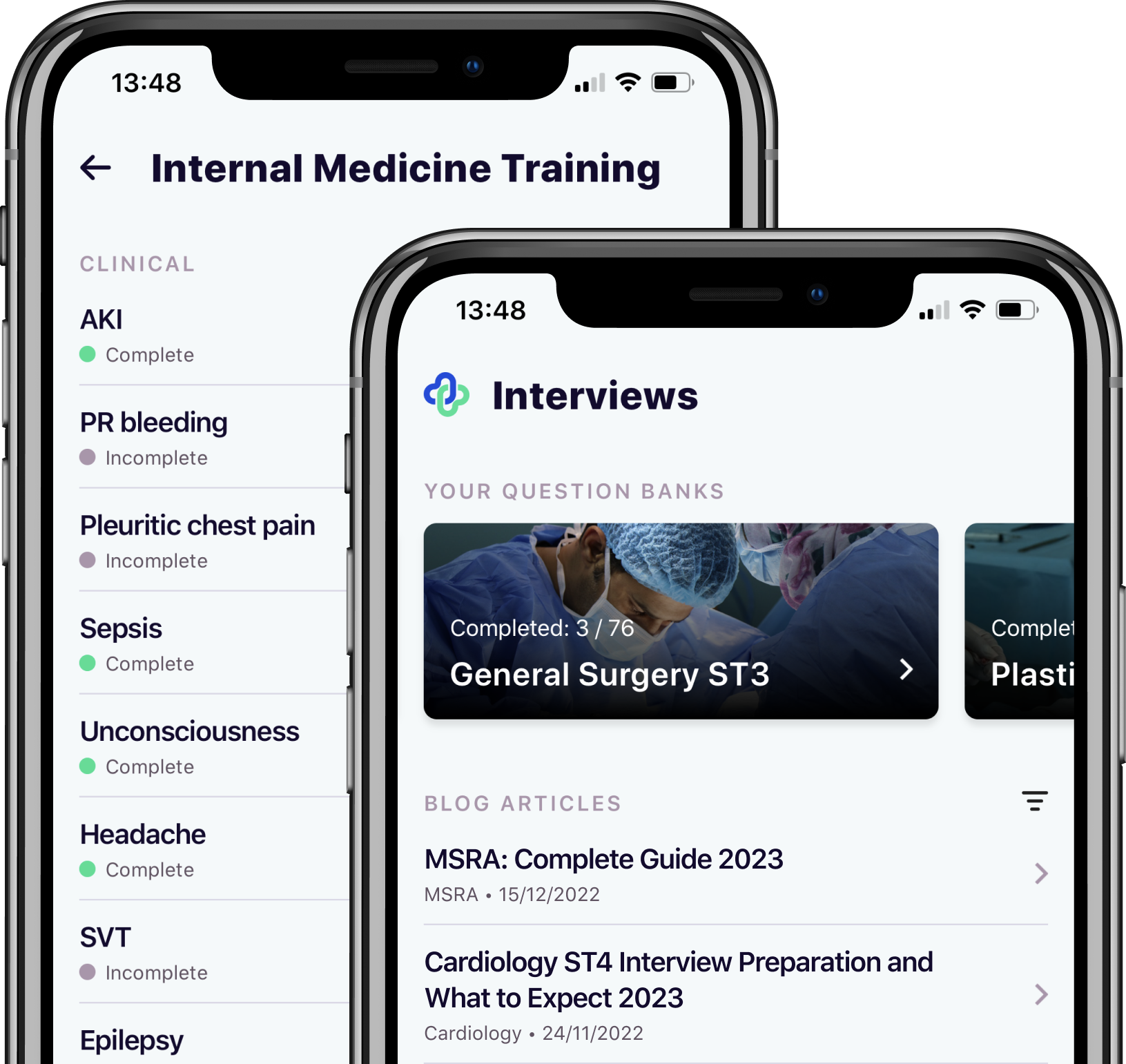
Take your subscriptions with you
Our mobile app allows you to access your interview and exam question banks wherever you are.

